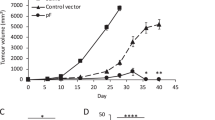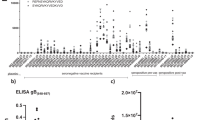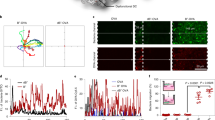Abstract
THE concept of reinforcing the immunological rejection reaction to a tumour by immunizing the host with tumour cells which have been modified by the introduction of a “helper determinant” onto their surfaces has been reviewed recently1. In general, tumour specific transplantation antigens (TSTA) on the surface membranes of tumour cells stimulate a relatively weak rejection reaction. If a strongly immunogenic determinant is coupled to the tumour cells, and the cells are then inoculated back into the host, a more intense immune response may be elicited which is also active against the TSTA alone. The helper determinant can be a hapten, a protein, a histocompatibility antigen (introduced into the tumour cell by hybridization with allogeneic cells), or a myxovirus which matures at the tumour cell surface. An early example of the use of a myxovirus as helper determinant is the work of Lindenmann and Klein2, who showed that A2G mice could be made immune to challenge with Ehrlich ascites tumour cells by vaccinating them with a cell-free homogenate of tumour cells which had been infected with influenza virus. Vaccination with a mechanical homogenate of uninfected tumour cells was without protective effect. Axler and Girardi3 prevented the expected appearance of tumours in hamsters due to inoculation of newborns with SV40 virus by vaccinating them during the latent period with homogenates of Newcastle disease virus-infected, SV40-transformed hamster tumour cells. Frozen-thawed lysates of non-NDV-infected SV40-transformed cells had no effect. We report here that BALB/c mice can be made immune to challenge with syngeneic, SV40-transformed fibrosarcoma cells by vaccinating them with cell-free homogenates of tumour cells which have been infected with influenza virus. No immunity is induced by vaccinating the mice with homogenates of influenza virus-infected normal cells, or with homogenates of tumour cells not previously infected with influenza virus.
This is a preview of subscription content, access via your institution
Access options
Subscribe to this journal
Receive 51 print issues and online access
$199.00 per year
only $3.90 per issue
Buy this article
- Purchase on Springer Link
- Instant access to full article PDF
Prices may be subject to local taxes which are calculated during checkout
Similar content being viewed by others
References
Mitchison, N. A., Transplant. Proc., 2, 92 (1970).
Lindenmann, J., and Klein, P. A., J. Exp. Med., 126, 93 (1967).
Axler, D. A., and Girardi, A. J., Proc. Amer. Assoc. Cancer Res., No. 11 (1970).
Aaronson, S. A., and Todaro, G. A., J. Cell. Physiol., 72, 144 (1968).
Duc-Nguyen, H., Rose, H. M., and Morgan, C., Virology, 28, 404 (1966).
Bretscher, P., and Cohn, Melvin, Science, 28, 1042 (1970).
Author information
Authors and Affiliations
Rights and permissions
About this article
Cite this article
BOONE, C., BLACKMAN, K. & BRANDCHAFT, P. Tumour Immunity induced in Mice with Cell-free Homogenates of Influenza Virus-infected Tumour Cells. Nature 231, 265–266 (1971). https://doi.org/10.1038/231265a0
Received:
Revised:
Issue Date:
DOI: https://doi.org/10.1038/231265a0
This article is cited by
-
Herpesvirus-induzierte Autoantik�rperbildung im Tierexperiment
Archives of Virology (1976)
Comments
By submitting a comment you agree to abide by our Terms and Community Guidelines. If you find something abusive or that does not comply with our terms or guidelines please flag it as inappropriate.



